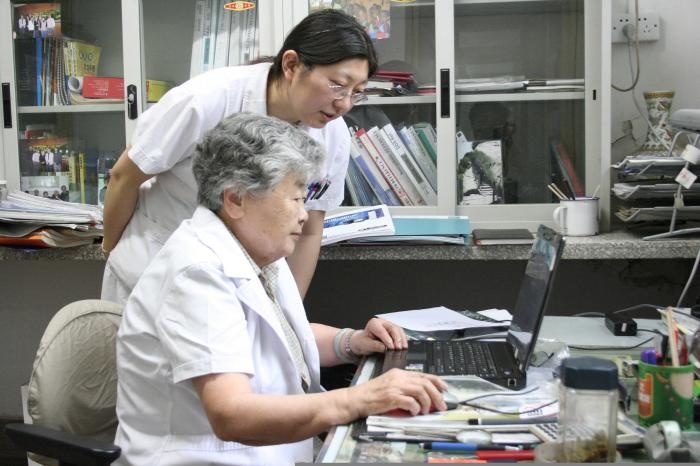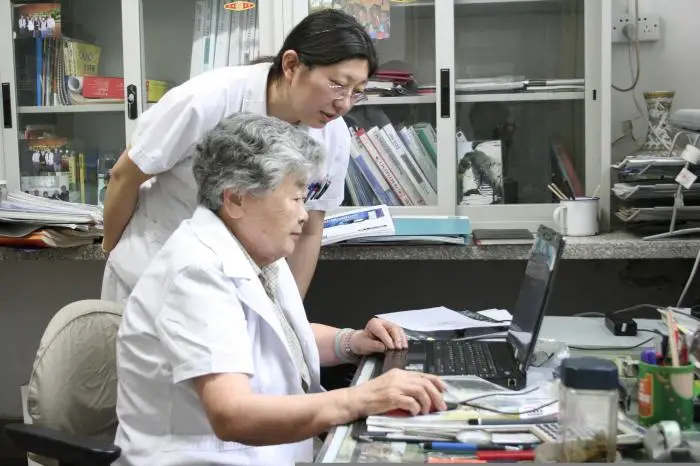By Bai Jianfeng, People's Daily

Li Huanying works with her assistant. (Photo courtesy of the Beijing Friendship Hospital affiliated to the Capital Medical University, and the Beijing Tropical Medicine Research Institute)
A simple birthday celebration was held at the Beijing Friendship Hospital on Aug. 17 for Li Huanying, a world-renowned expert on leprosy prevention and control who has just turned 100.
To a bouquet and a birthday cake, the centenarian made a noble wish - an early victory over leprosy.
Li was born on Aug. 17, 1921 in Beijing, and works for the Beijing Friendship Hospital and the Beijing Tropical Medicine Research Institute. Graduating from the Tongji University School of Medicine in 1945, she went to the Johns Hopkins University (JHU) the next year for a master's degree in bacteriology and public health, and worked as a research assistant at the JHU after graduating from there.
Later, Li became one of the first batch of officials of the World Health Organization (WHO) under the recommendation of the JHU when the UN health body was established in 1950. During her seven years of service, she was sent by the organization to multiple regions in Asia and America and highly praised by the organization for her arduous efforts made to contain the spread of infectious diseases.
When her term was about to end in 1957, the WHO proposed to renew the deal with her. However, she politely declined the invitation and returned to China as she felt she was very much needed by her country after seeing many other countries plagued by diseases due to poverty. She was 37 that year.
Leprosy is one of the most ancient infectious diseases in human history. The only way to fight it in early 20th century was to quarantine patients, because there was no specific cure back then.
Serving as a visiting scholar to the WHO in 1980, Li learned that the organization was studying a new method of combined chemotherapy for leprosy. The pharmaceutical formulation had been completed, but there was not enough clinical data. Therefore, she applied for free medicine and support from the WHO, and started pilot projects in China.
In pilot villages in southwest China, Li never wore protective suit when facing leprosy patients, so as to establish a closer relation with them and reduce their fear for the disease. That's why she was popular in every village she visited.
To promote fixed-duration combined chemotherapy, a treatment method that turns lifelong medication into fixed course for leprosy patients, she worked painstakingly and visited villagers door-to-door. With concrete efforts, she eliminated people's discrimination against leprosy patients, and proved that the disease is totally curable.
Li had been traveling among remote and impoverished regions for years, leaving her footsteps wherever leprosy patients were in 59 counties of seven prefectures in Yunnan, Guizhou and Sichuan provinces.
In 1990, she turned Nanxing village in Mengla county, Xishuangbanna Dai autonomous prefecture, Yunnan province, which was once hard hit by the disease, leprosy-free. The village was later renamed Mannanxing, which means "new life" in Dai language.
Thanks to her ceaseless efforts, Li shortened the course of medication for leprosy patients to two years, and reduced the number of leprosy patients from around 110,000 to less than 10,000. The annualized relapse rate was also brought down to 0.03 percent, much lower than the one-percent standard set by the WHO.
Li's fixed-duration combined chemotherapy was promoted worldwide in 1994, and two years later, she spearheaded a special campaign to eliminate leprosy in China, which was hailed "the world's best treatment campaign." In 2016, Li received a lifelong achievement award for leprosy prevention and control in China.
Over the past decades, Li has made multiple major strategies and tackled key problems in leprosy prevention and control, laying a solid foundation for the global elimination of the disease.
In recent years, she and her research team started studies in molecular biology, and have made a series of breakthroughs in the early diagnosis of leprosy, genetic test of antimicrobial resistance, and molecular epidemiology.
Today, the centenarian is still concerned about leprosy prevention and treatment. "The disease shall be terminated in our generation," she said.
To a bouquet and a birthday cake, the centenarian made a noble wish - an early victory over leprosy.
Li was born on Aug. 17, 1921 in Beijing, and works for the Beijing Friendship Hospital and the Beijing Tropical Medicine Research Institute. Graduating from the Tongji University School of Medicine in 1945, she went to the Johns Hopkins University (JHU) the next year for a master's degree in bacteriology and public health, and worked as a research assistant at the JHU after graduating from there.
Later, Li became one of the first batch of officials of the World Health Organization (WHO) under the recommendation of the JHU when the UN health body was established in 1950. During her seven years of service, she was sent by the organization to multiple regions in Asia and America and highly praised by the organization for her arduous efforts made to contain the spread of infectious diseases.
When her term was about to end in 1957, the WHO proposed to renew the deal with her. However, she politely declined the invitation and returned to China as she felt she was very much needed by her country after seeing many other countries plagued by diseases due to poverty. She was 37 that year.
Leprosy is one of the most ancient infectious diseases in human history. The only way to fight it in early 20th century was to quarantine patients, because there was no specific cure back then.
Serving as a visiting scholar to the WHO in 1980, Li learned that the organization was studying a new method of combined chemotherapy for leprosy. The pharmaceutical formulation had been completed, but there was not enough clinical data. Therefore, she applied for free medicine and support from the WHO, and started pilot projects in China.
In pilot villages in southwest China, Li never wore protective suit when facing leprosy patients, so as to establish a closer relation with them and reduce their fear for the disease. That's why she was popular in every village she visited.
To promote fixed-duration combined chemotherapy, a treatment method that turns lifelong medication into fixed course for leprosy patients, she worked painstakingly and visited villagers door-to-door. With concrete efforts, she eliminated people's discrimination against leprosy patients, and proved that the disease is totally curable.
Li had been traveling among remote and impoverished regions for years, leaving her footsteps wherever leprosy patients were in 59 counties of seven prefectures in Yunnan, Guizhou and Sichuan provinces.
In 1990, she turned Nanxing village in Mengla county, Xishuangbanna Dai autonomous prefecture, Yunnan province, which was once hard hit by the disease, leprosy-free. The village was later renamed Mannanxing, which means "new life" in Dai language.
Thanks to her ceaseless efforts, Li shortened the course of medication for leprosy patients to two years, and reduced the number of leprosy patients from around 110,000 to less than 10,000. The annualized relapse rate was also brought down to 0.03 percent, much lower than the one-percent standard set by the WHO.
Li's fixed-duration combined chemotherapy was promoted worldwide in 1994, and two years later, she spearheaded a special campaign to eliminate leprosy in China, which was hailed "the world's best treatment campaign." In 2016, Li received a lifelong achievement award for leprosy prevention and control in China.
Over the past decades, Li has made multiple major strategies and tackled key problems in leprosy prevention and control, laying a solid foundation for the global elimination of the disease.
In recent years, she and her research team started studies in molecular biology, and have made a series of breakthroughs in the early diagnosis of leprosy, genetic test of antimicrobial resistance, and molecular epidemiology.
Today, the centenarian is still concerned about leprosy prevention and treatment. "The disease shall be terminated in our generation," she said.
 Menu
Menu
 Chinese bigwig in leprosy studies turns 100
Chinese bigwig in leprosy studies turns 100
















